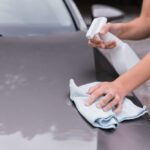
Car detailing and car cleaning may seem like the same thing, but they’re actually quite different.
It’s important to know the difference between them and why it matters, so you can make sure your car looks its best.
In this article, we’ll discuss the difference between car detailing and car cleaning, as well as why it’s important to know the distinction.
What Is Car Detailing?
Car detailing is a process of thoroughly cleaning and restoring the interior and exterior of a car. It involves much more than just washing and waxing, as it is usually considered an all-inclusive vehicle service. Detailing can involve many different steps, such as polishing, vacuuming, shampooing, waxing, steam cleaning, and more.
DIY detailing is becoming increasingly popular since it allows car owners to save time and money by doing the work themselves. However, certain services require professional services due to the complexity of the job and the specialized tools needed to complete it correctly.
When people talk about car detailing, they are typically referring to the process of making a vehicle look its absolute best and bringing out its full potential through careful restoration and maintenance. Detailing includes tasks such as polishing paintwork, addressing any scratches or blemishes on the bodywork, deep-cleaning interior surfaces such as carpets and upholstery fabric, applying protective coatings on both interior and exterior surfaces to help protect against fading or damage from UV rays or other elements, among other tasks.
In comparison to detailing, car cleaning is more focused on removing dirt from the surface without any additional restorative measures taken afterward. This usually involves washing with soap or detergent followed by a wax or sealant for protection against further dirt build-up.
Car cleaning does not usually include polishing paintwork or treating interior surfaces with protectants like detailing – although it can if desired by the customer. Car cleaning is a more basic alternative to detailing that helps keep vehicles looking their best without going into too much detail or restorative work on them.
Transitioning into this process then is what we’ll discuss next to understand what car cleaning entails fully.
What Is Car Cleaning?
Car cleaning is the process of removing dirt, dust, stains, and other debris from the exterior and interior of a car. Unlike car detailing, which includes deep cleaning and restoring the appearance of a car using specialized tools and products, car cleaning focuses primarily on removing dirt and dust.
While car detailing may involve waxing services to protect the paint from UV rays and regular maintenance to keep the body looking new, car cleaning does not include these services. A few key items that differentiate car cleaning from detailing include:
- Car Cleaning mostly involves washing or spraying down the exterior with soap and water, while detailing also involves polishing and waxing;
- Car Cleaning doesn’t usually involve restoring or protecting surfaces while detailing does;
- Detailing typically takes longer than cleaning because it requires more time-intensive processes such as steam cleaning carpets;
- Car Cleaning doesn’t usually include repairing dents or scratches, which are included in some detailing packages.
When deciding between car cleaning vs. detailing, it’s important to consider your desired outcome for your vehicle as well as how much time you have available for maintenance. Car cleaning can be done quickly but won’t provide lasting protection against UV rays or other damage caused by road debris.
For a deeper clean that provides long-term protection for your vehicle’s paint job and interior upholstery, investing in professional auto detailing is recommended over basic car washing services. With this in mind, let’s explore the benefits of car detailing next.
Benefits Of Car Detailing

Car detailing is a more complete form of car care than car cleaning. It involves thoroughly cleaning the vehicle inside and out, including vacuuming the interior, polishing the exterior paintwork, and waxing to protect the finish. Additionally, it includes restoring the paintwork with a clay bar or compound polish to remove dirt and contaminants that regular washing cannot. This helps maintain and restore the original shine of the vehicle’s paint.
Detailing goes beyond just cleaning and protecting surfaces; it also covers treating leather upholstery with conditioner, shampooing carpets and mats, removing odors from interiors, dressing tires, and even steam cleaning engines. All these processes help to extend the life of your car’s surface finishes as well as keep them looking their best for longer periods of time.
The benefits of detailing are extensive; it not only improves the appearance of your vehicle but can help maintain its value over time by keeping its surfaces in good condition. In addition to restoring paintwork, detailing can help protect your car’s finish from future damage caused by salt or road grime build-up.
Detailing can also help you identify wear and tear before it worsens so you can fix it sooner rather than later. With this in mind, transitioning into a discussion about the benefits of car cleaning is critical to understanding how both processes work together to provide long-term maintenance for your vehicle.
Benefits Of Car Cleaning

Car cleaning is essential to maintaining a vehicle’s overall appearance and performance. It can help increase the car’s resale value and reduce maintenance costs.
Car cleaning involves washing the car’s exterior to remove dirt, mud, and other debris. This helps protect the paint job from fading and promotes a longer-lasting shine. The car’s interior should also be cleaned regularly to free it from dust and debris that can interfere with controls and surfaces.
Car cleaning also helps extend the life expectancy of parts such as brakes, tires, and engine components that may become damaged or clogged due to dirt buildup.
In contrast, car detailing goes beyond basic cleaning by restoring or enhancing a car’s original look and feel. Detailing includes polishing, waxing, shampooing carpets, steam-cleaning upholstery, applying dressings to plastic surfaces, and more detailed work on metal components such as chrome.
It can also include minor repairs such as fixing dents or scratches in the bodywork or replacing headlights or windshield wipers that have worn out over time. While this type of work takes more time than basic car cleaning tasks, it can do wonders to preserve a vehicle’s aesthetic appeal for many years.
The difference between car detailing and car cleaning is clear. While regular cleaning helps maintain a vehicle’s functionality over time, detailing helps enhance its overall look and appearance to retain its beauty for many years.
Both types of services are essential when caring for your vehicle — but knowing why they matter will ensure you make smart decisions about how best to care for yours in the long run.
Why Does It Matter?
The difference between car detailing and car cleaning is significant and matters for a few reasons.
Car detailing is the process of professionally cleaning and conditioning the exterior and interior of a vehicle to restore its original condition. This includes removing dirt, grime, dust, scratches, and oxidation from inside and outside a vehicle.
Car cleaning, on the other hand, is usually done by an amateur or DIYer, with an emphasis on making the car look clean rather than restoring it to its original condition.
Car detailing is essential for protecting the paint from environmental contaminants that can damage it over time. Detailing involves using specialized tools such as clay bars to remove surface contaminants like tree sap or bird droppings that sit on top of the clear coat. Additionally, detailing involves applying waxes or sealants to protect the paint from UV rays which can cause fading over time.
Properly maintained paint can also help maintain a vehicle’s value in the long run. For these reasons, car detailers are often considered professional auto care specialists who take pride in their work and strive to produce results that make vehicles look showroom ready. The attention to detail these professionals provide ensures maximum protection for your vehicle’s paint while maintaining its value over time.
In comparison, car cleaning is simply an attempt at making a car look presentable without restoring it to its original condition or protecting it from harm caused by environmental contaminants.
Frequently Asked Questions
How Much Does Car Detailing Cost?
DIY detailing can cost anywhere from 2500 to 10000, depending on the amount of products used and the size of your car.
However, if you want a professional job, then you should plan to pay anywhere from 5000 to over 25000 for a full detail.
Professional detailers typically use higher-grade products and more advanced techniques, which is why it costs more.
How Long Does Car Detailing Take?
Car detailing typically takes longer than car cleaning, as it involves more extensive work.
Depending on the level of detailing you choose, the job can take anywhere from one to several hours.
A full detailing includes a thorough wash and waxing with a clay bar, which can help remove stubborn dirt and contaminants from the paintwork.
Additionally, interior shampooing, polishing, and vacuuming may be needed for a complete level of detailing.
All these processes add up and can cause the time spent on car detailing to vary greatly.
How Often Should I Detail My Car?
When it comes to car detailing, the frequency of polishing and maintenance depends on a few factors.
The amount of time spent driving, the age of your car, and the type of environment you live or drive in are all important considerations when determining how often to detail your car.
Generally speaking, experts suggest that cars should be detailed anywhere from every 3 months to once a year.
However, if your car is exposed to harsher elements like sand or salt water, you may need to detail more frequently than once a year.
Additionally, if you want to keep your vehicle looking its best for as long as possible, more frequent detailing can help maintain its value and appeal.
How Do I Find A Qualified Car Detailer?
When looking for a qualified car detailer, it’s important to do your research.
Read reviews and ask around to see what people say about the service standards of any potential detailers.
Make sure they offer the services you’re looking for and that they have good reviews.
Ask friends or family if they can recommend someone who has done work for them in the past.
This can give you an idea of what kind of quality you can expect from a car detailing service.
What Products Should I Use For Car Detailing?
When it comes to car detailing, polishing techniques and interior protection products are key.
Depending on the condition of your car, you may need to use different products.
For example, if your car is in need of a deep clean or has scratches and swirls, an abrasive polish can help restore its appearance.
To protect the interior from dirt and dust build-up, a durable sealant may be necessary.
With the right products, you’ll be able to achieve a showroom finish.
Conclusion
In conclusion, car detailing is an essential step in keeping your car looking its best. It’s more expensive than regular cleaning, but it’ll make your car look better and last longer.
When deciding if it’s right for you, consider how often you drive, the condition of your car, and whether or not you have the time to do a good job yourself.
To find a qualified detailer, ask for recommendations and read reviews to ensure they’re reputable.
With the right products and techniques, you can ensure your car looks great for years to come!



